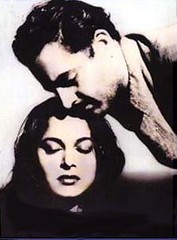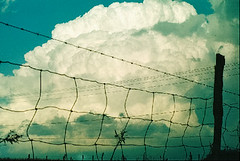Pyaasa (1957)
Dir. Guru Dutt
Writ. Abrar Alvi
w/ Guru Dutt, Waheeda Rehman
Throughout his contemplative study of a poet out of place among his people, Guru Dutt presents the film community with the state of modern India using the story of one man as a sort of tressel board. Personifying the aforementioned poet, Vijay, Dutt manages to quietly comment upon the effects of British Imperialism while also conveying his great feeling for his culture. Vijay haunts the streets of his village like an apparition until he hears Gulab, a lady of the night, singing one of the poems that his brothers have turned into waste paper for a trifling. Now intent upon publishing the remainder of his work, he gets a job for a man who harbors ill will against him, the man who married his college muse without attaining her love. When Vijay runs into Meena, his lost muse, the heavens open up in a choreographed musical number, the kind which would provide a benchmark for many a future Bollywood production, albeit in color.
To say that despite the black and white medium, Pyaasa engages and maintains the viewer's senses adequately rings true enough, but the cinematographer's use of light and dark sequences that change with the narrative sets terrific tone. In an encounter with a huddled, starving untouchable, in which Vijay gives up his jacket, the frames grow so dark that certain bits look directly influenced by early horror films like Nosferatu. His poems, all of which he sings, set the pace of the film, each more beautiful than the last. They seem to speak of a land of loveliness lost and nearly unreachable largesse of the soul in the wake of the caste system. Of course, as McNelly pointed out, without the subtitles, a lot gets left to the imagination. Somehow, though, Dutt's masterpiece grasps a full range of ideals and absolutes in such a way that Pyaasa still acts as a complete film without them. The melodies help out, yes, but mostly the filmmaker deals in plot and paradise, from the opening shot of the poet enjoying himself by watching a bee buzzing around in the grass one moment, but getting trampled underfoot by a passerby the next.
The rest of the film unfolds the nature of the man himself though the lens of his country. College-educated and middle-class, Vijay should garner the respect of his peers, but he can't even expect that from a restauranteur. A rich weasel getting into his automobile mistakes him for an unskilled laborer when he tries to help him with his parcels, and makes a show of complaining about the educated having to work like that, but still hands him a counterfeit coin as payment. The only people who recognize and hold him dear as a simple human being removed from more desirable economic circumstances walk the streets just as he does. One of the most delightful and unexpected of these provides comic relief, the plight of the common man, and several necessary distractions in the form of Sattar, a man who gives hair oil massages for pennies. These scenes provoke laughter without any wincing at cultural sterotypes. Dutt's simply much too bright, focused, and purposeful to rely on any such blemishes.
Possibly, the spiritual implications of Pyaasa serve its legacy best. Dutt himself had a hard time emotionally while filming, going through a split with his wife that may have been exacerbated by rumors that he was having an affair with leading lady, Rehman, as the exotic Gulab. His solid, consistent presence makes sense in light of such tidings, his mental state adding to the torment that the film demands of him. He uses grating comparisons to further heighten the scope of the drama. As he drunkenly grieves, a young mother is coerced into continuing dancing although her baby cries for her. Dutt and Alvi's sense of the state of man and of India leave little to criticize. If anything, his commentary opens a floodgate of questions that have nothing to do with politics, economics, or any of the affairs of government, but rather of the unknown and how letting go can be good. Whether or not he saw the beauty of his own work clearly enough to carry it with him always can not be known, though; the revered director died of an overdose of sleeping pills in 1964.















0 Comments:
Post a Comment
<< Home